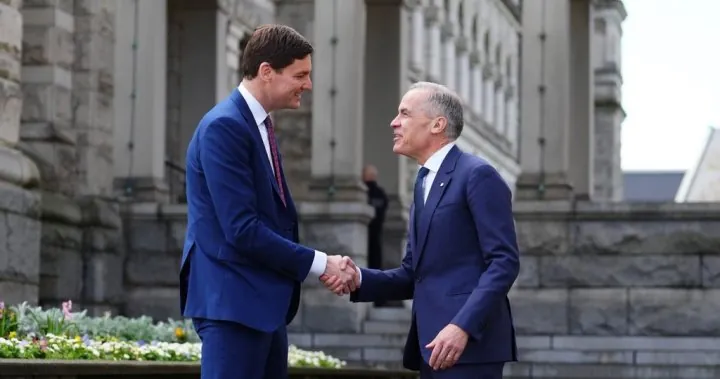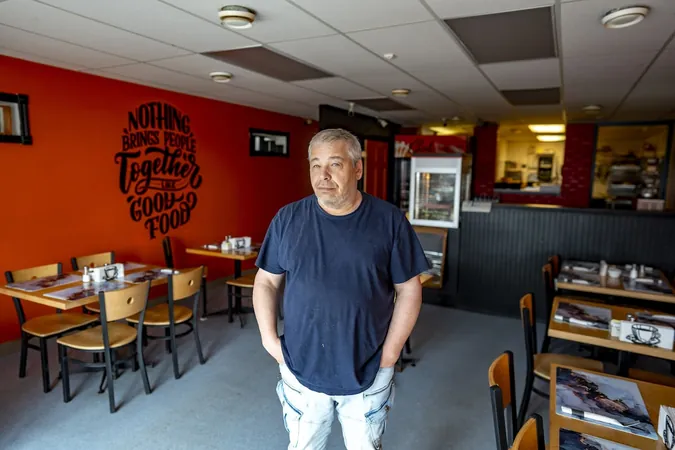
Eby and Carney Emphasize Softwood Lumber in Critical Meeting Amidst Escalating Trade Tensions
2025-04-07
Author: Michael
Introduction
In a significant meeting between British Columbia Premier David Eby and Prime Minister Mark Carney in Victoria on Monday, discussions centered on crucial issues including softwood lumber tariffs, national transportation corridors, affordable housing, and expediting major infrastructure projects. The timing was particularly pressing, as the U.S. Department of Commerce recently announced plans to more than double tariffs on Canadian softwood lumber to a staggering 34.5 percent—a move Eby called a “renewed assault” on Canada’s forestry sector.
Proactive Approach to Tariffs
Eby highlighted a proactive approach to combat these escalating tariffs by advocating for the increased use of British Columbia’s mass timber in housing construction. “In the face of a growing trade war, we must meet the rising domestic and international demand for value-added wood products,” Eby stated, indicating a collaborative spirit to counteract the severe impact these duties could have on Canadian forestry exports.
Team Canada Response
He articulated the need for a “Team Canada” response, reminiscent of the strategies employed to protect the manufacturing and auto sectors in Ontario and Quebec. Eby expressed confidence that other provinces would rally to support British Columbia in this endeavor.
Transportation and Skilled Trades
Beyond softwood lumber, Eby emphasized that regardless of the federal election's outcome, it is imperative for the next government to collaborate on resolving transportation challenges and enhancing skilled trades training.
Prime Minister Carney's Position
Prime Minister Carney, engaged in a campaign trip, reiterated his previous discussions with Eby about the softwood lumber issue and recognized the unjust nature of the new tariffs. “These tariffs are wholly unjustified, and we are committed to fighting against them,” Carney declared. He noted that the federal government acknowledges the significance of the timber industry, which supports tens of thousands of jobs across the country.
Opportunity in Housing
Carney also pointed to a golden opportunity for British Columbia in modular housing and mass timber as part of the federal government's initiative to accelerate homebuilding. His campaign has proposed a national housing strategy aimed at constructing half a million homes annually—twice the current output. This vision underscores the importance of utilizing Canadian resources, including timber.
Opposition from BC Lumber Trade Council
The BC Lumber Trade Council has voiced strong opposition to the U.S. tariffs, urging the Commerce Department to retract its decision and warning that the increased levies threaten workers’ livelihoods on both sides of the border and will ultimately raise lumber prices for American consumers. Council president Kurt Niquidet maintained that British Columbia's lumber industry operates under competitive market principles rather than subsidies, countering claims of unfair advantages.
Local Political Leaders' Concerns
Moreover, local political leaders from the federal New Democrats expressed alarm over the impact of ongoing tariffs on the forestry sector, with MP Gord Johns emphasizing the urgent need for infrastructure development, including hospitals and bridges, utilizing Canadian lumber.
Conclusion
As both levels of government work together, British Columbia stands at a crossroads, facing significant challenges but also opportunities to showcase its natural resources in a way that benefits both Canadians and our American neighbors.









 Brasil (PT)
Brasil (PT)
 Canada (EN)
Canada (EN)
 Chile (ES)
Chile (ES)
 Česko (CS)
Česko (CS)
 대한민국 (KO)
대한민국 (KO)
 España (ES)
España (ES)
 France (FR)
France (FR)
 Hong Kong (EN)
Hong Kong (EN)
 Italia (IT)
Italia (IT)
 日本 (JA)
日本 (JA)
 Magyarország (HU)
Magyarország (HU)
 Norge (NO)
Norge (NO)
 Polska (PL)
Polska (PL)
 Schweiz (DE)
Schweiz (DE)
 Singapore (EN)
Singapore (EN)
 Sverige (SV)
Sverige (SV)
 Suomi (FI)
Suomi (FI)
 Türkiye (TR)
Türkiye (TR)
 الإمارات العربية المتحدة (AR)
الإمارات العربية المتحدة (AR)